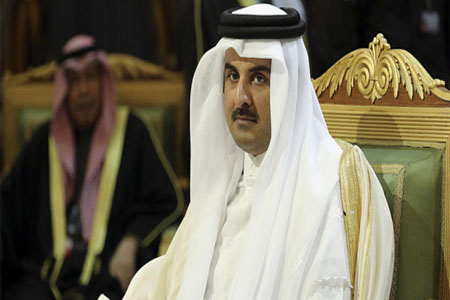
Afrasianet - Qatar, accused by Saudi Arabia and its allies of supporting "terrorism" and coming close to Iran despite Gulf opposition to the rapprochement, has rejected its neighbors' demands to restore ties with it just hours before the end of its 10-day deadline. While the media talked about the Emir of Qatar to Kuwait today to respond to the demands of the boycotters.
The demands, which were formally presented to Doha on June 22, include the closure of Al-Jazeera and the reduction of relations with Tehran, Riyadh's arch-rival in the Middle East, and the closure of a Turkish base in the emirate.
With the end of the deadline for Doha to respond to the demands on Sunday evening, attention is directed to Riyadh, Abu Dhabi and Manama, which may move on escalating steps that could include the increase of sanctions aimed at besieging Qatar economically and cracking down on it politically.
"The embargo countries have prepared a list of demands to reject," Foreign Minister Mohammed bin Abdul Rahman al-Thani told a news conference in Rome on Saturday after meeting Italian counterpart Angelino Alvano.
Gulf newspapers reflected the official Gulf position on Qatari rejection, saluting new sanctions against the small, gas-rich emirate.
Al-Bayan newspaper said the Qatari leadership was pushing it "into the unknown", warning that Doha faces "decisive sanctions" after its demands were rejected.
In Saudi Arabia, the front page of the Riyadh newspaper said: "The escalation looms in the face of Qatar's perseverance."
On June 5, Saudi Arabia, the United Arab Emirates, Bahrain and Egypt cut off ties with Qatar and imposed economic sanctions on it, accusing Doha of supporting "terrorist" groups and rapprochement with Iran.
But Doha, which receives the largest US air base in the region, denied the accusations, issued about two weeks after the publication of remarks by its emir, Sheikh Tamim Hamad al-Thani, in which he criticized the Gulf states, but Doha said it was wrong and was broadcast on the official news agency .
"The demands are contrary to international law and are not aimed at combating terrorism, but are aimed at undermining our sovereignty, violating the sovereignty of the State of Qatar, striking the freedom of the press and media, and imposing a state of prevention against the State of Qatar," he said. .
"We are now seeing the channels of the embargo countries inciting violence and carrying out terrorist operations in Qatar, which indicates the double standards of these countries and their inability to keep up with Al Jazeera," he said, referring to Arab satellite channels funded by Saudi Arabia and the United Arab Emirates.
"The State of Qatar wants to engage in dialogue but in accordance with appropriate principles and conditions ... We are trying to be more practical with the Kuwaiti mediation, coordinated and supported by the United States."
For years, Qatar has relied on diplomacy, media and sports to consolidate its position in the region and the world. This has angered its neighbors, especially Saudi Arabia, which has been fighting for decades with Iran in the Middle East.
In a first attempt in 2014, the Gulf states sought to return Qatar to the policies of the Gulf Cooperation Council, which includes Saudi Arabia, the United Arab Emirates, Bahrain, Kuwait and Oman,
In light of Doha's reception of rejected figures from these countries, including elements in the Muslim Brotherhood.
Relations with Doha were cut off, but soon returned after a summit in Riyadh, in which the emir of Qatar pledged to remove Islamic figures and to ask Al-Jazeera to ease its criticism of the policies of Arab countries.
Qatar's oil-rich states say Doha has not honored the pledges.
Experts say the Gulf dispute with Qatar began in 2010 when the emirate was directly involved in the events of the Arab Spring, from Libya to Syria, despite the Gulf states' opposition to protests that pushed some regimes to change.
In the face of the crisis in its second public version, Doha, which has huge investments in several countries, including France and Britain, has gone abroad, specifically to the major powers, in an attempt to push it to exert pressure on its boycotting countries to end the attempt to besiege it.
However, Qatar has met with double standards in the American position on the crisis. The Foreign Ministry has adopted the process of pushing for a diplomatic solution and bringing the views closer. President Donald Trump has even accused Doha of funding terrorism, although his country has signed military agreements with Qatar and conducted exercises with it. Combat.
Kuwaiti, French and American mediators have failed to reach a solution at a time when the United Arab Emirates says the dispute with Qatar and the sanctions against it, including the closure of air, sea and land, may last for years.

